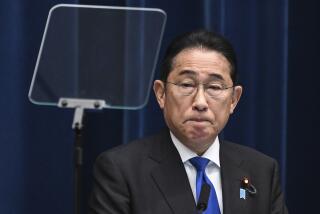Japanâs Hosokawa Gives Up Plans to Form New Cabinet
TOKYO â After two weeks of futile efforts to win approval from his coalition partners, Prime Minister Morihiro Hosokawa announced late Wednesday that he is abandoning plans to form a new Cabinet to carry out economic reforms.
In his third late-night news conference in three months, Hosokawa said he will retain his existing Cabinet, at least until Japanâs fiscal 1994 budget is enacted, to maintain unity of the seven lower house and eight upper house parties supporting him.
The new blow to his leadership nonetheless displayed what appears to be an irreparable split between the right and left wings of his coalition, which embraces a political spectrum ranging from Liberal Democratic Party defectors to Marxist-imbued Socialists.
It also forces him to retain as a chief aide and coordinator of the Cabinet a leader who has openly questioned his decisions.
The flap created a two-week hiatus in Japanâs efforts to resolve trade frictions with the United States.
After failing to reach agreement on a framework for economic relations in a meeting with President Clinton on Feb. 11, Hosokawa promised to act âurgentlyâ to come up with a new Japanese proposal. But now a deadline has been set for the end of March.
In a nationally televised news conference that began after 11 p.m., Hosokawa said he had wanted to form a new Cabinet to focus on economic reforms and U.S.-Japan economic relations.
The mission of enacting political reforms, the Cabinetâs initial goal when Hosokawa took over last August, has largely been accomplished, he added.
But he could not win approval from the left-leaning wing of his coalition, Hosokawa said.
Constitutionally, the prime minister is empowered to act alone in appointing and dismissing cabinets or ministers.
âThe coalition is built upon a delicate balance. A zigzag course is unavoidable,â Hosokawa admitted.
It was the second time in two months that the prime minister was forced to bow to his coalitionâs left wing.
In January, Socialist rebels defeated Hosokawaâs political reform bills in the upper house, forcing him to accept a compromise with the opposition Liberal Democrats.
And in February, when Hosokawa announced his intention to raise a controversial consumption tax to finance income tax cuts--also in a middle-of-the-night news conference--the Socialists threatened to bolt the coalition.
A day later, Hosokawa withdrew his decision.
Chief Cabinet Secretary Masayoshi Takemura, who sided with the Socialists against Hosokawaâs tax proposal, refused to resign or accept another Cabinet post.
Socialists and the middle-of-the-road Democratic Socialist Party supported Takemura and warned that any Cabinet shuffle would split the coalition.
Takemura condemned as âimperialisticâ a Hosokawa proposal to amalgamate the coalition parties into a single parliamentary negotiating group to deal with the opposition.
The prime minister said he had scolded Takemura but had received assurances of future cooperation from the leader of the New Party Harbinger.
More to Read
Sign up for Essential California
The most important California stories and recommendations in your inbox every morning.
You may occasionally receive promotional content from the Los Angeles Times.










